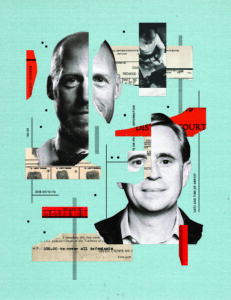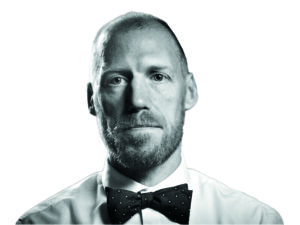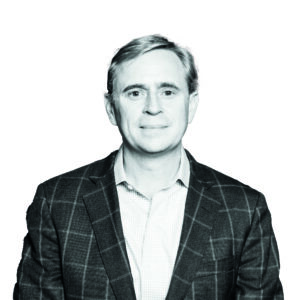Piecing Together the Facts
Two alumni cross paths in advancing social justice
Although they work on opposite sides of the country in vastly different fields, James Kessler ’94 and Noah Cox ’02 share a desire to improve people’s lives. It was that drive that brought them together on a project documented in the Clio Award-winning short film Forgiving Johnny.
The film, directed by two-time Academy Award-winner Ben Proudfoot and released by his Breakwater Studios in 2023, recounts the story of how Cox, a deputy public defender in Los Angeles County, leveraged digital records to navigate a complex legal archives system and to successfully defend a client with developmental disabilities.
Kessler is a senior vice president at Publicis Sapient, the Boston-based digital consultancy that spent about five years creating that digital client case management system with the Los Angeles County Public Defender’s Office (LACPDO), where Cox is on the Neurocognitive Disorders Team.

“L.A. has the oldest and largest public defender’s office in the world,” Kessler says. “Before this digitization, they had stacks and boxes of paper everywhere and a warehouse that looked like the scene from the end of Raiders of the Lost Ark.”
Cox says it was difficult and time-consuming to research, assemble, and carry around stacks of files, all while providing extra support to clients who need it most. The new cloud-based system can retrieve a warehouse full of data from a laptop, freeing up Cox to meet with clients and to collaborate with social workers and health care providers to build defenses and to create treatment plans.
“Anything that gives us more time to focus on the actual work of assisting people contributes to us being able to do a better job, leading to better outcomes,” Cox says.
Kessler notes that the system offers more than efficiency. “Now you can analyze and mine data for patterns, using AI to help find things you didn’t even think to ask for,” he says. “The insights that are possible with digitization of data arm public defenders with strategies to help them provide a more balanced defense for their clients. It really is a game changer.”
While they collaborated for several years, the two Trinity alumni didn’t learn of their college connection until after the bulk of the project was complete and the film had been made about its impact. Their time on campus did not overlap, but both Cox and Kessler say they benefited from the liberal arts education that has been provided to Trinity students for more than 200 years.
“In order to be a successful public defender or a consultant and work on these big issues, you need the kind of strong foundation that you get from the Trinity experience,” Kessler says. “It sets you up so that you can have an impact on real people in the real world.”
‘My mission for years’
Cox traces his interest in public defense to his parents. “The idea of working with people who needed help was something they instilled in me,” says Cox, who began working in the LACPDO in 2007. “I realized how many people in the justice system had severe cognitive disorders that made their lives difficult. If you have a condition that affects your ability to learn, control emotional responses, or hold a stable job, it’s hard to benefit from the traditional criminal justice model.”

As part of a specialized team, Cox represents clients suspected of having cognitive deficits and also consults on cases with colleagues. “I really enjoy blending the worlds of law, psychology, and technology and figuring out how we can use those seemingly completely different fields to help somebody be more successful in life,” he says. “A liberal arts background is really good for that because you get varying perspectives and can explore different areas of knowledge.”
Cox says that majoring in English at Trinity prepared him for law school at the University of Miami and for his career through textual analyses and careful consideration of the meanings of words. “I remember reading 19th-century British poetry by Charles Darwin with [the late Professor of English] Dirk Kuyk. Working with him was a life-altering experience,” he recalls. “When I think about how Trinity influenced me and what I’m doing now, I think about the way he integrated fields in literature. We do that on my team, which I don’t think I’d be a part of without having those experiences with Trinity and with Professor Kuyk specifically.”
When LACPDO Chief Information Officer Mohammed Al Rawi asked Cox and Proudfoot to generate ideas for a film presenting the human impact of the office’s new technology, they selected Cox’s case with Johnny as a success story to highlight, yet Cox didn’t know that he himself would ultimately become the lead figure of the film.
“I thought I would be much more ancillary to the film,” he says. “While I’m not extremely comfortable in a public broadcast, I am strongly concerned about my clients who are vulnerable, historically ignored, and set up to fail. If they don’t get the right treatment, they’re likely to have the same problems reoccur. Supporting them has been my mission for years, so I did the film for these goals and to be true to who I am. The reward I get for what I do is to see people who are succeeding.”
As Kessler notes, Cox is pursuing one of the hardest jobs in law and one that requires selfless dedication. “What he has chosen to do speaks volumes about who he is as a person,” Kessler says. “You don’t set out to be a public defender working in the neurocognitive unit because you want to be a movie star.”
Solving problems for people
Kessler—whose older brother Nat ’93 also went to Trinity, where they both met their wives (Hattie [Dane] Kessler ’92 and Caty [Campbell] Kessler ’93, respectively)—majored in engineering with a concentration in electrical engineering and studied digital signal processing with Professor of Engineering Taikang Ning. He and classmates in his band, Red House, performed around campus at the time when music began to transition from analog to digital, in a foreshadowing of Kessler’s later consulting work in digital business transformation.

“As I studied engineering at Trinity, then got my master’s in electrical engineering at Brown University, I began to realize I didn’t want to be a practicing engineer in the traditional sense,” Kessler says. “What I wanted to do was solve problems for people, and for me the best way to do that was through consulting. I excelled at speaking to clients, building relationships, and understanding and reframing their problems as impact opportunities.”
He has spent 28 years working at Sapient, first as a consultant in the energy industry, then financial services, and now leading the state and local public sector business unit, which advises and collaborates with state and local governments across the country. “What I use from Trinity are my abilities to read, write, speak, tell stories, relate to current events, and relate to other people in a wide range of circumstances,” Kessler says. “The ability to have a direct impact on human beings through my chosen craft of consulting and through my education as an engineer at a liberal arts college has led me to the holy grail of my career. Having an impact on people through your work is addictive.”
Cox says Kessler has brought energy, enthusiasm, and positivity to their partnership. “He has been so encouraging,” Cox says. “I really look forward to any time we’re going to be in the same room together. He is so motivated by and invested in this project and committed to pushing it forward in whatever way he can.”
Through their shared past at Trinity and their shared goals, Kessler and Cox found a connection that goes beyond majors and job titles. “If you didn’t know specifics about what we’re doing and just looked at our résumés, you’d say these people have nothing in common,” Cox says. “But then when you look at this example of how Johnny’s life went because of this case and how integral of a role technology played, you see how interconnected our lives can be.”
By Andrew J. Concatelli
